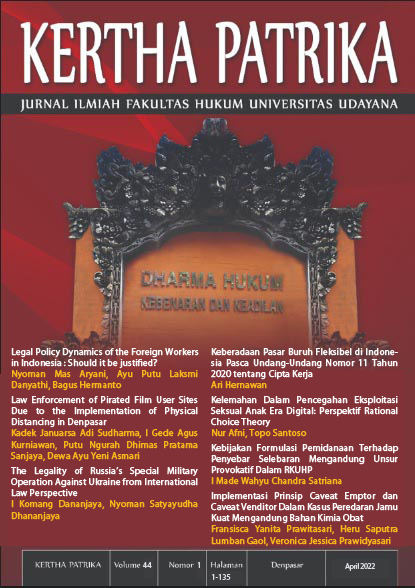The Legality of Russia’s Special Military Operation Against Ukraine from International Law Perspective
Abstract
Russia has launched a Special Military Operation against Ukraine, which resulted in a crisis therein. According to Vladimir Putin, current Russia’s President, the action aimed to exercise the state’s inherent right of individual and collective self-defense for the Donetsk People’s Republic (‘DPR’) and Luhansk People's Republic (‘LPR’). This article was aimed to analyze the legality of Russia’s use of force. This article applied normative legal research and using statutory, case, conceptual, and fact approaches in analyzing the case. The study indicated that Russia’s Special Military Operation constitutes illegal use of force. Based on the criteria set in international law, Russia’s justification for individual self-defense is invalid since no armed attack exists, unnecessary and unproportionate. As well as its collective selfdefense plea, which does not apply in these circumstances as DPR and LPR statehood is not clear, let alone its United Nations membership status. Suppose that it does apply, the use of force is still unlawful since other non-forcible means are available to achieve the end sought.
Downloads
References
Brownlie, I. (1963). International Law and the Use of Force by States. Oxford: Clarendon
Press.
Crawford, J. (2006). The Creation of States in International Law. Oxford: Oxford University
Press.
Crawford, J.R. (2019). Brownlie’s Principles of Public International Law (9th Edition). Oxford:
Oxford University Press.
Daase, C., Geis, A., Fehl, C., Kolliarakis, G (Eds). (2015). Recognition in International
Relations: Rethinking Political Concept in A Global Context. Frankfurt: Springer.
Gardam. J. (2004). Necessity, Proportionality, and the Use of Force by States. New York:
Cambridge University Press.
Gray, C. (2018). International Law and the Use of Force Fourth Edition. Oxford: Oxford
University Press.
Harris, D. (2010). Cases and Materials on International Law. London: Sweet & Maxwell.
Henkin, L. (1990). International Law: Politics, Values and Function. Leiden: Martinus
Nijhoff.
Jessup, P.C. (1968). A Modern Law of Nations. Hamden, CT: Archon Books.
Kubicek, P. (2008). The history of Ukraine. California: Greenwood Press.
Lowe, V. (2007). International Law. Oxford: Oxford University Press.
Magocsi, P.R. (1996). A History of Ukraine. Toronto: University Toronto Press.
Sayapin, S., Tsybulenko, E. (eds) The Use of Force against Ukraine and International Law.
The Hague: Asser Press.
Shaw, M. (2017). International Law Eighth Edition. New York: Cambridge University
Press.
Szporluk, R. (2000). Russia, Ukraine, and the Breakup of the Soviet Union. Stanford: Hoover
Institution Press.
Weller, M. (2017). The Oxford Handbook of the Use of Force in International Law. Oxford:
Oxford University Press.
Journals
Coppieters, B. (2018). Four Positions on the Recognition of States in and after Soviet
Union, with Special Reference to Abkhazia. Europe-Asia Studies 70(6): 991-1014, DOI:
https://doi.org/10.1080/09668136.2018.1487682/
Dries, S.F. (2015). Crimea’s Separation from Ukraine: An Analysis of the Right to SelfDetermination and (Remedial) Secession in International Law. Netherland International
Law Review. 62: 329-363. DOI: https://doi.org/10.1007/s40802-015-0043-9
Grant, T.D. (2015). Annexation of Crimea. The American Journal of International Law.
109(1): 68-95. DOI: 10.5305/amerjintelaw.109.1.0068.
Armed Activities on the Territory of the Congo (DRC v Uganda) (Judgement) [2005] ICJ
Rep 168.
Case concerning Military and Paramilitary Activities in and against Nicaragua
(Nicaragua v United States of America), (Jurisdiction and Admissibility), Judgement
1984 ICJ Report 392
Colombian-Peruvian Asylum Case (Colombia v. Peru) (Judgment) [1950] ICJ Rep.
Jurisdictional Immunities of The State (Germany v Italy) (Judgment) [2012] ICJ Rep 99.
Legality of the Threat or Use of nuclear weapons (Advisory Opinion) ICJ Rep 1996.
Military and Paramilitary Activities in and Against Nicaragua (Nicaragua v US) (Merits)
[1986] ICJ Rep 14
North Sea Continental Shelf Cases (Germany v. Denmark; Germany v. Netherlands)
(Judgment) [1969] ICJ Rep 3
Oil Platforms (Islamic Republic of Iran v United States of America) (Merits) [2003] ICJ
Rep 161
Internet
Aljazeera. (2022). ‘Smell of Genocide’: How Putin Justifies Russia’s war in Ukraine.
Available from: https://www.aljazeera.com/news/2022/3/9/smells-of-genocidehow-putin-justifies-russias-war-in-ukraine (Accessed on 11th March 2022).
Aljazeera. Do not call Ukraine invasion a ‘war’, Russia tells media, schools. Available
from https://www.aljazeera.com/news/2022/3/2/do-not-call-ukraine-invasion-awar-russia-tells-media-schools (Accessed on 3rd March 2022)
Aljazeera. Putin says he wants Ukraine’s NATO question resolved ‘now’. Available from
https://www.aljazeera.com/news/2022/2/15/putin-ukraine-nato-membershipquestion-must-be-resolved-now. (Accessed on 27th February 2022).
CNN Business. The List of Global Sanctions on Russia for The War in Ukraine. Available
from https://edition.cnn.com/2022/02/25/business/list-global-sanctions-russiaukraine-war-intl-hnk/index.html. (Accessed on 1st March 2022).
EJIl: Talk! Blog of European Journal of International Law. (2022). Was Russia’s
Recognition of the Separatist Republics in Ukraine ‘Manifestly’ Unlawful? Available
from https://www.ejiltalk.org/was-russias-recognition-of-the-separatist-republics-inukraine-manifestly-unlawful/ (Accessed on 5th March 2022).
Charter of United Nations
Convention on the Prevention and Punishment of the Crime of Genocide
International Covenant on Civil and Political Rights
International Covenant on Economic, Social and Cultural Rights
Montevideo Convention on Rights and Duties of States
North Atlantic Treaty
Vienna Convention on The Law of Treaties
International Documents
Council of Europe. (2020). Application of The European Charter for Regional or Minority
Languages, initial monitoring cycle.
Embassy of Bolivia the Hague. (2009). Written Commentary by The Plurinational State
of Bolivia to Request for An Advisory Opinion of The International Court of Justice on
Whether the Unilateral Declaration of Independence of Kosovo Is In Accordance With
International Law.
Embassy of the Argentine Republic. (2009). Written Statement of The Argentine Republic
Accordance with International Law of The Unilateral Declaration of Independence by
The Provisional Institutions of Self-Government of Kosovo.
Human Rights Committee. (2022). Concluding observations on the eighth periodic
reports of Ukraine. CCPR/C/UKR/CO/9.
International Law Commission. (2018). Draft Conclusions on the identification of
customary international law, with commentaries UN Doc. A/71/10.
Written Statement of The Republic of Azerbaijan Accordance with International Law of
The Unilateral Declaration of Independence by The Provisional Institutions of SelfGovernment of Kosovo.
United Nations Documents
UNGA Res 3314 (XXIX), 14th December 1974, Annex.
United Nations General Assembly Resolution 68/262, (1st April 2014), A/RES/68/262.
United Nations General Assembly Resolution A/ES-11/L.1.
Case Law
Accordance with International Law of the Unilateral Declaration of Independence in
Respect of Kosovo (Advisory Opinion) [2010] ICJ Rep, p. 403.
France 24. Dozens detained at anti-war rallies in Russia. Available from
https://www.france24.com/en/live-news/20220302-dozens-detained-at-anti-warrallies-in-russia (Accessed on 3rd March 2022).
Herbert Smith Freehills. Sanction Tracker - Russian Counter Sanctions. Available from
https://hsfnotes.com/sanctions/2022/03/03/sanctions-tracker-russian-countersanctions/#page=1 (Accessed on 4th March 2022).











